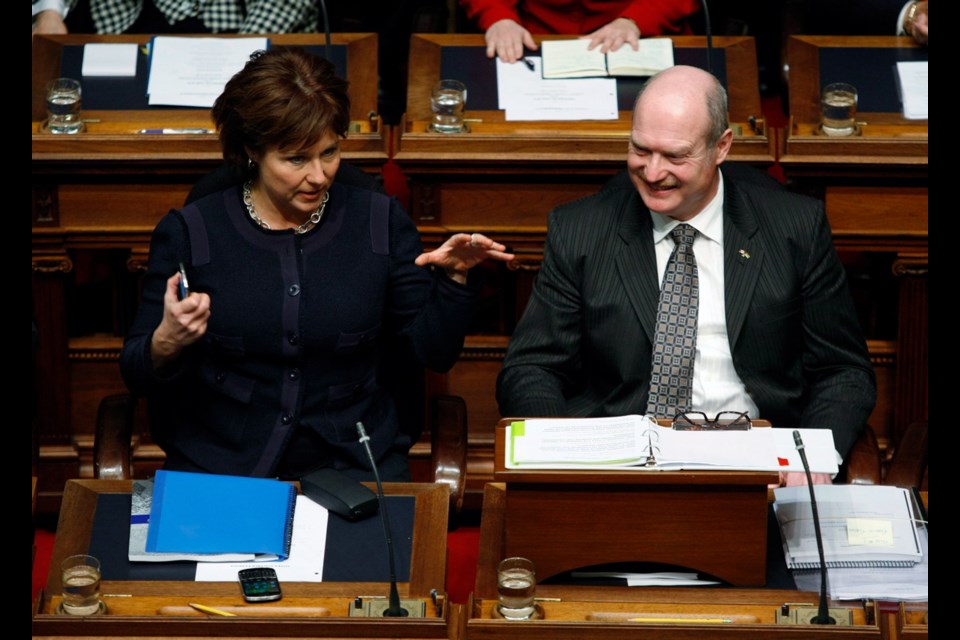The B.C. government introduced a balanced budget today that includes a small surplus, modest help for vulnerable children and adults, and money to fuel its plans for a liquefied natural gas industry.
Finance Minister Mike de Jong also announced a tax increase on cigarettes, a new film tax credit for the capital region and a hike in medical service plan premiums.
De Jong said his government will finish the coming fiscal year $184 million in the black and remain one of only two members in an “exclusive club” of provinces boasting balanced budgets.
“In fact, depending on what happens in Saskatchewan, it could end up being a club of one,” he said.
The $44.4-billion budget also reveals government’s plan to introduce legislation this fall for a two-tier tax regime on income from liquefied natural gas.
A first tier tax rate of 1.5 per cent and a second tier of seven per cent will apply to net income from the liquefaction of natural gas at LNG facilities.
The first tier will kick in at the beginning of production; the second would take effect once capital investment costs have been deducted.
None of the LNG tax revenue, however, will appear in the budget for several years, de Jong said.
“This is a revenue stream that begins once the facility has been constructed and once the product begins to flow,” he said. “We don’t see that happening within the life span of this three-year fiscal plan.”
In addition, the budget sets aside $29 million to attract LNG investment, ease the processing of permits and protect the environment. The money will be spread among the ministries of aboriginal relations, environment, forests and natural gas development.
Other spending increases include:
- $61 million to ease caseload pressures for people with developmental disabilities
- $5 million for children and youth with special needs
- $8 million for rising RCMP costs
The budget raises the threshold for the first-time home buyers program to $475,000 from $425,000. The exemption could save buyers up to $7,500 in property transfer tax.
De Jong also announced good news for Victoria’s film industry. Productions that begin shooting in the capital region after Feb. 19 will be able to claim the six-per-cent distant location tax credit.
The Greater Victoria Chamber of Commerce applauded the move, noting that movies were bypassing the region because the credit did not apply here previously.
“It’s a tremendous economic impact for Victoria,” said Bruce Carter, chief executive officer. “It will be as much as a three or four-fold increase in the amount of filming activity we’ve got in Victoria.”
De Jong did have “bad news” for smokers.
The budget increases the tax on cigarettes by 32 cents a pack on top of the 40-cent increase announced by the federal government.
The tax hike will raise $50 million and government will devote a significant portion to cancer prevention, de Jong said.
“This is a stream of revenue we’d like to see disappear.”
Medical Service Plan premiums will also go up by four per cent on Jan. 1, 2015 — the sixth straight increase. The overall health budget will increase an average of 2.6 per cent a year over three years to nearly $17.9 billion by 2016-17.
The finance minister said the province will continue to keep a tight control on spending and expects to deliver $76 million in savings this year. A further $50 million will come for its ongoing “core review” of government services.
In addition, about $580 million worth of surplus properties have been sold or are currently on the market.
The province’s debt will continue to increase to nearly $70 billion by 2016-17 as government borrows money to build schools, hospitals and roads.
But De Jong said the province’s debt-to-GDP ratio will “cap out” at 18.5 per cent this year before being to decline moderately.
Elsewhere, the budget remains frozen for K-12 education, while spending on colleges and universities continues to decline.
Teresa Rezansoff, president of the B.C. School Trustees’ Association, expressed disappointment that de Jong ignored public schools in the budget.
“Those cost pressures will continue to be there for us, and they are escalating,” she said.
Jim Sinclair, president of the B.C. Federation of Labour, said the ongoing cuts to advanced education undermine efforts to create jobs.
“It may be balanced in the house across the street here, but for average British Columbians, they’re struggling to have a balanced budget and a decent job.”
Sinclair said the LNG industry “is a possibility,” but it requires training to make sure British Columbians can do the jobs it will create.
“If we don’t start now, that won’t happen, because we can’t start the day construction starts,” he said.
Philip Hochstein, president of the Independent Contractors and Businesses Association of B.C., praised the budget.
“People are calling this a triple-B boring budget, but to me, boring means stability and predictability, which is exactly what investors want,” he said. “British Columbians want no surprises in budgeting anymore. So I think it strikes the right balance.”
He also said government appears to have struck the right balance in its proposed LNG tax regime.
“Really, it’s up to the marketplace to decide whether they’re going to invest here,” he said. “But nothing the government will do will change that decision.”



